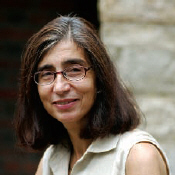Associate Dean of the College Adele Wolfson
Discusses
the Experience of Women in Math and Science
FOR IMMEDIATE RELEASE:
September 23, 2009 |
|
WELLESLEY, Mass. – In 2005, Harvard University President Lawrence Summers came under fire for suggesting that the shortage of female scientists might be attributed to innate differences between the sexes. Today, the number of women in fields such as math, physics and some kinds of engineering, remain very low, while other sciences are slowly moving toward a gender equilibrium.
 |
“We sometimes forget that the strength of Wellesley in the sciences is not just that all of our students are women, but that half of the faculty are too, providing a powerful model of how women can succeed, and how men and women can work respectfully and productively together in these fields," Wolfson said. |
“In the life sciences, women represent a substantial fraction, sometimes more than half of students, although we don't yet see those numbers reflected in faculty ranks and high level appointments,” said Adele Wolfson, associate dean of the college at Wellesley.
In a “talk-back” discussion, Wolfson addressed ongoing issues of gender equality in math and science following actress Gioia De Cari’s comedic one-woman show, “Truth Values: One Girl’s Romp Through MIT’s Male Math Maze.” The play, partly inspired by Summers’ comments, discusses the challenges of being a female graduate student in mathematics in the 1980s and the struggle to find one’s passion. Wolfson was joined at the Sept. 17 panel by Janice Rossbach, a 1951 MIT alumna, and Mia Minnes, an MIT post-doctoral fellow in mathematics.
“Much of the play, unfortunately, rang true to the panel that responded afterward,” Wolfson said.
Wolfson noted that Wellesley students are fortunate to have the opportunity to learn science in a place where everyone believes they are capable of succeeding. Alumnae take that attitude into graduate school and the workplace, and are therefore less likely to internalize any discouragement they may face.
“Several Wellesley alumnae were in the audience for my talk-back and came up to me afterward saying that they had felt ‘inoculated’ against any prejudice they encountered after leaving Wellesley,” Wolfson said. “We sometimes forget that the strength of Wellesley in the sciences is not just that all of our students are women, but that half of the faculty are too, providing a powerful model of how women can succeed, and how men and women can work respectfully and productively together in these fields.”
Wolfson, associate dean of the college, holds the Nan Walsh Schow ’54 and Howard B. Schow professorship in the natural and physical sciences, and is a professor of chemistry at Wellesley. Along with other Wellesley College administrators, she has worked to create programs that support the academic success of all students and to raise awareness of stereotype threats.
She is particularly interested in science education, innovative pedagogy and the participation of women and underrepresented minorities in science. She has served as faculty director of the Science Center and as faculty director of the Pforzheimer Learning and Teaching Center.
“Truth Values” runs through Sept. 27 at the Central Square Theater in Cambridge, Mass. For more information, visit www.centralsquaretheater.org/season/09-10/truthvalues.html.
Since 1875, Wellesley College has been a leader in providing an excellent liberal arts education for women who will make a difference in the world. Its 500-acre campus near Boston is home to 2,300 undergraduate students from all 50 states and 68 countries. For more information, go to www.wellesley.edu.
###
|

